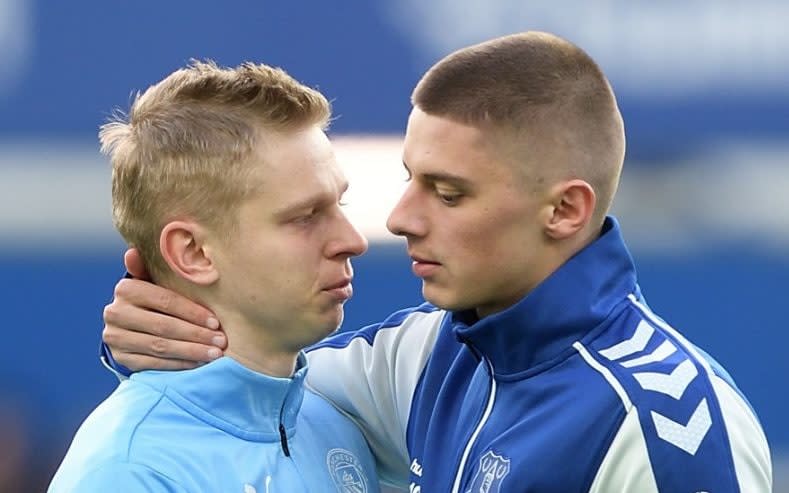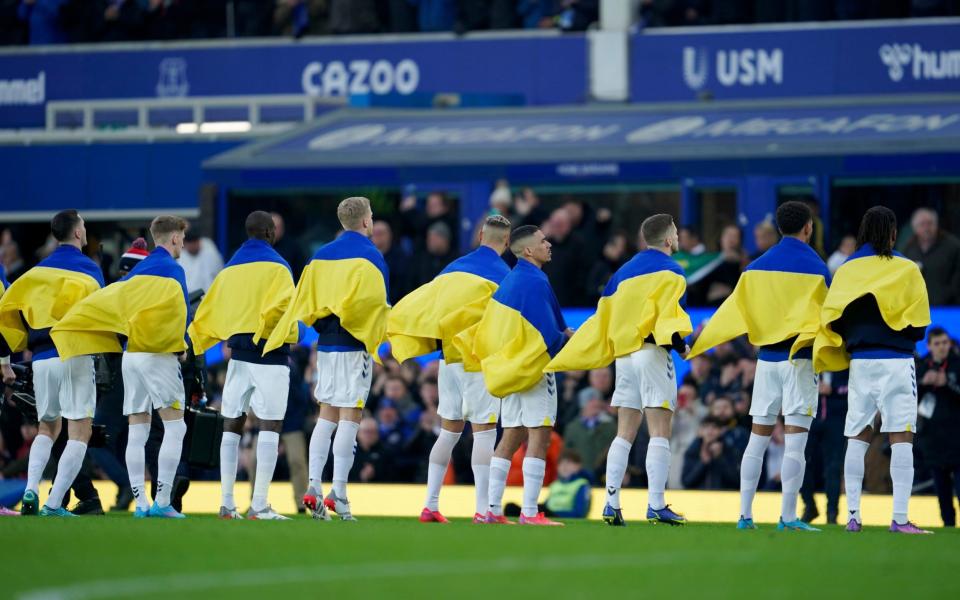A year on, this picture remains one of the most poignant sights in football

There’s an overused expression in football about a team ‘wanting it more’. If that was the truest measure of success, England would face the world champions at Wembley on Sunday.
The harrowing backstories of many of Ukraine’s players make the notion of playing for your country more consequential than achieving Euro 2024 qualification, each international fixture a means to reassert freedom and independence.
No expression of Ukrainian solidarity, patriotism and defiance on English soil was more powerful than that two days after Russia’s invasion in February, 2022, when two of Ukraine’s most high profile international footballers playing for rival clubs embraced and shed tears before the Premier League fixture between Manchester City and Everton.
Over 35,000 spectators stood and applauded as Oleksandr Zinchenko and Vitaliy Mykolenko shared the witness testimonies of their terrified families as Russian bombs dropped on Kyiv. Millions were heartened by the images from Goodison Park as they accompanied those at West Ham’s London Stadium in a ‘Stop the War’ video message delivered by the Ukraine squad. Here was a profound statement of how naive those who say sport and politics should not mix.
In dealing with the intolerable pressure of balancing professional ambitions abroad while seeking the latest sobering updates from home, Zinchenko and Mykolenko have embraced a role as ambassadors and messengers. They unapologetically use their social media accounts to communicate on behalf of their government.
“People are dying. Houses and squares are disappearing, but our faith in victory is not,” the Ukraine players pinned to their Instagram account.
“The aggressor has launched a powerful false propaganda that we must fight against by telling the truth to the whole world.”
Zinchenko, a regular attendee of anti-war protests in Manchester, is emboldened by a purpose beyond football.
“I have one and half million followers on Instagram and my mission is to show the world the real truth,” Zinchenko told Gary Lineker in an emotional BBC interview last year.
The ability to compartmentalise professional and private commitments has astounded colleagues.

Speaking to Everton’s club programme last month, Mykolenko revealed how his father, Sergei, was due to attend the City fixture for his first glimpse of his son at the club he had just joined. His flight was scheduled to leave as the Russians advanced. Instead of heading to Liverpool, Mykolenko Snr enrolled into the Ukrainian army. Mykolenko was informed that even trying to contact his father was life-threatening.
“My father was in a bunker,” he said.
“He had little or no connection to use his phone, so we spoke rarely and using text messages was dangerous because we weren’t sure if Russian soldiers could intercept them and gain information.
“He is still in the military now, based in Kyiv but if he’s needed somewhere else he will go.”

Everton have naturally offered the full range of their support network to Mykolenko and have been awestruck by the courage and maturity he has displayed under duress. He has sought no special attention from his club beyond an understanding that his social media will occasionally offer commentary on events at home.
As a key component of Arsenal’s Premier League title bid, Zinchenko is the most high profile of Ukraine’s English-based contingent. He is on the threshold of joining the elite few to win Premier League titles with two different clubs. References to Zinchenko’s courage and leadership barely scratch the surface of his strength of character. It is surely no coincidence that this has been more prominent on the field at his new club, paralleling his inspirational qualities off it, as if he is being driven by a higher cause.
"I'll be honest, if not for my daughter, my family, I would be there [in Kyiv]," Zinchenko said in that powerful BBC interview.
Zinchenko and Mykolenko’s moving experiences are nightmarishly standard for Ukrainian footballers building their career abroad.

Former West Ham winger Andriy Yarmelonko not only intervened to help his wife and child escape from Kyiv when the invasion began, but acted on behalf of the relatives of his teammate, Brugge striker Roman Yaremchuk.
"My wife's parents were in Chernihiv. The situation was so critical that I didn't know what to do,” Yaremchuk said.
“I turned to Andriy Yarmolenko, knowing that he is from Chernihiv. Of course, Andriy responded to my request, and two days later they were out.”
Deeper bonds have been forged in a squad which has become more openly patriotic over the last 12 months, players now encouraged to speak Ukrainian rather than Russian. Their enduring presence on the global sporting stage - particularly at a world-renowned venue such as Wembley - assumes greater symbolism given the United Kingdom's support for their cause.
There is a valid argument that such a qualifier ought not be necessary. What message would have more compellingly demonstrated the support of the competing nations than Uefa guaranteeing Ukraine’s participation in next summer’s finals in Germany?
Whatever the outcome at Wembley or in the remaining qualifying campaign, Ukraine’s players have become accustomed to demonstrating stoicism amid trauma.

 Yahoo Sport
Yahoo Sport 




































































